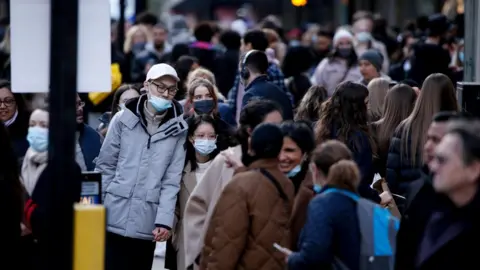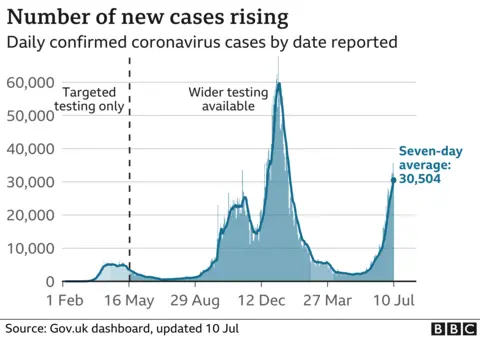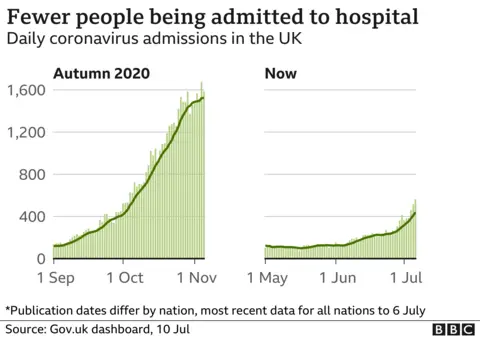Covid to get worse before it gets better, doctors warn
 PA Media
PA MediaThe situation with Covid will get worse before it gets better with cases "rising dramatically", medical leaders have warned.
The Academy of Medical Royal Colleges said people should remain cautious, taking measures such as wearing face coverings in crowded indoor spaces.
It has warned that the NHS is "under unprecedented pressure".
On Monday the government is expected to confirm whether the easing of measures in England will go ahead on 19 July.
The UK is experiencing a marked increase in cases according to the Office for National Statistics, while Health Secretary Sajid Javid has previously said he would expect numbers of infections to reach about "50,000 new cases a day" by that date.
On Saturday, the UK recorded 32,367 new cases and 34 deaths within 28 days of a positive test.
It is the fourth day in a row case numbers have been above 30,000, while Friday saw the highest daily figure since 22 January.
Prof Helen Stokes-Lampard, chairwoman of the Academy of Medical Royal Colleges, told BBC Radio 4's Today programme the academy was "cautious about issuing dire warnings" but she had become "profoundly concerned" over the last couple of weeks about the idea of removing all restrictions on 19 July.
"There seems to be a misapprehension that life will return to normal from then and that we can throw away all the precautions and, frankly, that would be dangerous," she said.
In a statement the academy, which represents 23 medical bodies responsible for training and development in various specialties, said it was essential that people took a responsible approach when restrictions were formally lifted.
It warned that there was "little doubt that things will get worse before they get better".
The academy said there were reports of routine care being postponed due to healthcare professionals isolating amid mounting pressure as people who had stayed away from the NHS during the pandemic now sought treatment.
It added that the growth of long Covid, as well as the backlog of elective work which had built up during the crisis, meant that "it is like the worst of a bad winter in July".
"There is no doubt that we will get to a position when this dangerous and erratic disease is largely under control for the population as a whole and we can 'learn to live with' Covid-19.
"However, we are not in that position yet and sadly, we have to expect things to get worse again."


A few hospitals in the UK have announced that non-urgent surgery is being postponed because of rising admissions of Covid patients, very high patient numbers at A&E and staff absences caused by self-isolation requirements.
Now medical leaders suggest this will become more widespread and are predicting that across the NHS things will get worse before they get better.
The sobering message is that this is the situation, even after the success of the vaccination programme in reducing the relative levels of hospital admissions and deaths.
In essence, the Academy of Medical Royal Colleges - the professional voice of doctors - is saying that the Covid impact will be felt for many more months and right through next winter.

Prof Anthony Harnden, who is deputy chair of the Joint Committee on Vaccination and Immunisation which advises the government on the vaccine rollout, said that although it was "worrying" that infections were rising again, "at some point we have got to get back to normality".
He told the Today programme: "We're in the middle of summer and, providing people carry on behaving responsibly - which I think they will do - then we're in a much better position" than in previous waves.
He said the vaccination programme had gone "incredibly well" but there was still "a long way to go", adding that increasing vaccination rates was key.
Prof Harnden said around 55% of 18 to 29-year-olds had received their first dose of a Covid vaccine nationally but it was the early stages and he was confident of better uptake among young people.
Dr Mike Tildesley, an epidemiologist and member of the SPI-M modelling group, told Times Radio that high levels of cases could "challenge the virus" to mutate into variants which the current vaccines are less effective against.
He added that there was "a risk" with the planned 19 July reopening but that should decrease "as we go through August and we get more people vaccinated".




Most Covid rules are set to end in England from 19 July. Announcing the plan, Prime Minister Boris Johnson said that if the government did not go ahead with the easing of restrictions now then it ran the risk of "either opening up at a very difficult time when the virus has an edge" or "putting everything off to next year".
The government has previously said it has taken a cautious approach to the roadmap in England, delaying the next step to allow for millions more vaccinations so those most at risk are fully protected.
Among the changes to restrictions that have been announced are:
- Fully vaccinated UK residents arriving in England from amber travel list countries will no longer have to quarantine from 19 July
- Those in England who are double-jabbed will not have to self-isolate if a close contact tests positive for Covid from 16 August
- An end to the Covid "bubble" system in schools which has seen hundreds of thousands of pupils have to self-isolate
- The wearing of face coverings will no longer be legally required and the rule of six inside private homes will be scrapped
- No limits on attendance at weddings and funerals
Meanwhile, a study has found that Covid vaccines are highly effective in people with underlying health conditions who were advised to shield earlier in the pandemic.
Being fully vaccinated reduced the risk of symptomatic Covid-19 by about 90%.

- WHERE DOES FOOTBALL COME FROM?: The history of the game currently capturing everyone's attention
- THE ORWELL PRIZE WINNING PODCAST: A raw story of gangs, drugs and the school trying to fix it all

